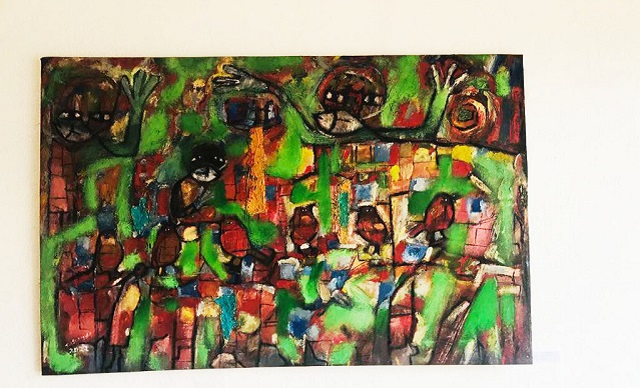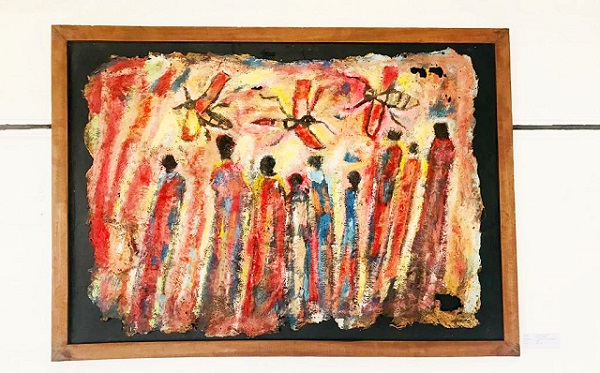
The exhibition Recycling and Environmental sustainability suggests the need to preserve the environment and humanity
Kampala, Uganda | DOMINIC MUWANGUZI | There’s no
doubt that Tusiime Mathias as an artist continues to make heads roll on
the Uganda Contemporary Art scene. His latest Solo exhibition Recycling
and Environmental Sustainability has further etched him as one the most
outstanding innovative and hardworking artists of his generation. As is
the norm in many of his exhibitions in recent years, the self propelled
artist with a humble background in art, delves into the theme of
recycling and environment sustainability to tackle the subject of
artistic innovation and research, while reminding everyone of the need
to preserve the environment we live in. Interestingly, his message is
timely given the fact environment safety and preservation dominates many
conversations globally today.
Tusiime’s media in the exhibition is primarily barkcloth paper which
is a representation of both recycling and environment sustainability.
Barkcloth paper is an innovation of the artist which is produced from
regular barkcloth and through a rudimentary process of soaking the
fabric and beating it down, a highly textured material is created. The
focus on working with such organic material provides deeper
conversations about his art beyond what is easily palpable in the
exhibition: the process of recycling and environmartal sustainability.
Barkcloth fabric will also bring into perspective the subject of
materiality in art which has always been a central subject of discussion
by artists working with traditional material. While Tusiime doesn’t
originate from Buganda, a central region of Uganda where barkcloth
features prominently in the traditional social life of the citizenry,
his relationship with the fabric is legitimated by his routine
interaction with the people of the region.

The artist chooses to work with barkcloth to deliberately draw his
audience to his work. Perhaps, tackling the subject of environment
sustainability with another material would not have sufficed. Barkcloth
is largely known in the academia as a sustainable fabric because of its
organic quality and the ability to preserve the tree ( Mutuba) from
which it is harvested. One doesn’t have to cut down the tree to harvest
the fabric but will skillfully cut off the bark from the tree trunk. As
the artist works with this fabric in its improved form, he is already
giving it a new identity. Such identity is critical in its preservation
as a canvas that can be painted on. Equally, its occupation of the
gallery space, where it is showcased as part of the work, implicitly
illustrates the preservation of the traditional into the modern.
The innovative approach exhibited in this new body of work says more
about Tusiime as a keen observer of the community he lives in and its
immediate surroundings. The more than 15 paintings carry nuanced
feelings and emotions of himself as both an artist and individual. As he
goes about his daily routine of working at Makerere School of
Industrial and Fine art, he picks inspiration for his art from the art
lecturers and students. Equally, the endless hustle and bustle in his
neighbourhood of Nassana provides fertile grounds to experiment with the
unusual which he blends in his artistic expeditions. Noteworthy, the
palette and subjects in his paintings have a quality of uneasiness that
may remind one of the chaotic scenery of such neighborhoods.
Tusiime’s work can best be described as a social commentary on
everyday life. While the artist tackles the subject of recycling and
Environmental sustainability in these works, he delicately wants to
communicate the need to preserve our humanity in a fast changing world
filled with selfish interests. Luckily, Tusiime has already achieved
this through his natural trait of love and kindness. If we borrow a leaf
from him and pay attention to want his art is saying, we shall
definitely save our planet.
The exhibition is showing at Makerere Art gallery located within the School of Industrial and Fine Art.
.jpg)





























